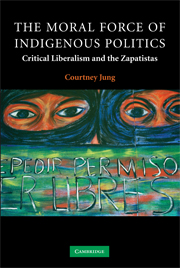Book contents
- Frontmatter
- Contents
- Acknowledgments
- Introduction
- 1 Stepping behind the claims of culture: constructing identities, constituting politics
- 2 Internal colonialism in Mexican state formation
- 3 “The politics of small things”
- 4 From peasant to indigenous: shifting the parameters of politics
- 5 The politics of indigenous rights
- 6 Critical liberalism
- Appendix: tables – indigenous population
- Bibliography
- Index
- CONTEMPORARY POLITICAL THEORY
3 - “The politics of small things”
Published online by Cambridge University Press: 14 September 2009
- Frontmatter
- Contents
- Acknowledgments
- Introduction
- 1 Stepping behind the claims of culture: constructing identities, constituting politics
- 2 Internal colonialism in Mexican state formation
- 3 “The politics of small things”
- 4 From peasant to indigenous: shifting the parameters of politics
- 5 The politics of indigenous rights
- 6 Critical liberalism
- Appendix: tables – indigenous population
- Bibliography
- Index
- CONTEMPORARY POLITICAL THEORY
Summary
Throughout most of the twentieth century, the inclusion of the peasant in the national project afforded subsistence farmers some limited access to state patronage. As an officially organized sector of party support and an important symbol of Mexican national identity, peasants were able to call on promises established in the Constitution to demand land redistribution, agricultural subsidies and credits, and some social services. Through corporatist institutional mechanisms, the Mexican government was able to limit peasants to la política de dar cositas – the politics of small things.
Starting in the 1970s, subsistence farmers in Chiapas (and elsewhere in Mexico) began to challenge the limits of their official role as a pillar of party support and to reinvest the peasantry with explicitly political content. Whereas the government had long tried to depoliticize the peasantry through co-optation, a new generation of activists attempted to forge a peasant political identity by broadening their claims, linking local demands with national struggles, and insisting on such principles as recognition and negotiation and not only on the provision of material goods and benefits.
Their ability to do so depended in part on structural changes, like government reforms that opened up the space for oppositional organization, and new employment opportunities that gave subsistence farmers greater independence from state patronage. Equally important, however, were the social changes that opened up the possibility of dissent and opposition at the communal level by disrupting the authority of traditional leaders.
- Type
- Chapter
- Information
- The Moral Force of Indigenous PoliticsCritical Liberalism and the Zapatistas, pp. 117 - 146Publisher: Cambridge University PressPrint publication year: 2008

